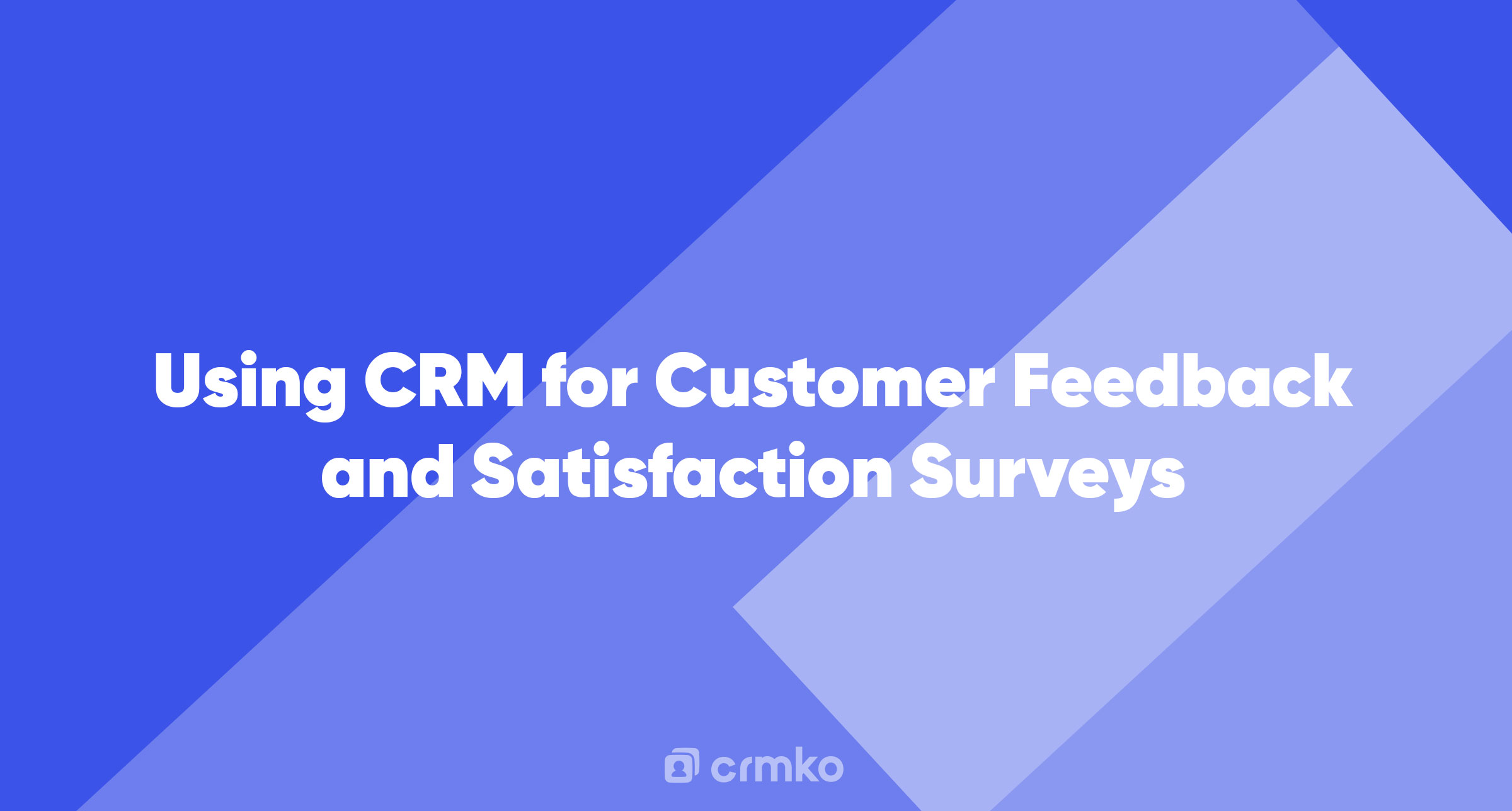Why Customer Feedback is Crucial
It's no secret that the customer experience plays a pivotal role in the success of any business. In fact, studies have shown that customer experience will overtake price and product as the key brand differentiator by 2020. To stay ahead of the competition, it's essential to listen to your customers and understand their needs and preferences.
Customer feedback provides valuable insights into customer satisfaction, loyalty, pain points, and expectations. It allows you to identify areas for improvement, resolve issues, and make data-driven decisions to optimize your products, services, and processes. By leveraging customer feedback, you can personalize your communication, enhance customer satisfaction, foster stronger relationships, and ultimately increase customer loyalty and retention.
The Role of CRM in Customer Feedback Management
CRM systems are designed to manage and optimize customer relationships. They serve as a central hub for storing and organizing customer data, tracking interactions, and automating sales and marketing processes. When integrated with customer feedback tools, CRM systems become even more powerful, enabling you to collect, analyze, and act on customer feedback effectively.
Benefits of CRM Feedback Tools
CRM feedback tools, such as surveys, polls, and Net Promoter Score (NPS) questions, allow you to gather feedback directly from your customers. These tools can be seamlessly integrated into your CRM system, enabling you to collect and store feedback data alongside other customer information. By using CRM feedback tools, you can:
- Segment Customers Based on Feedback: CRM feedback tools enable you to segment your customers based on their feedback scores, such as NPS, Customer Satisfaction (CSAT), or Customer Effort Score (CES). This segmentation allows you to tailor your communication and marketing strategies to each group, addressing their specific needs and expectations.
- Personalize Customer Interactions: By leveraging customer feedback, you can personalize your communication with customers based on their preferences, needs, and feedback. This personalization can include sending thank-you notes or rewards to loyal customers, addressing specific pain points, and offering tailored promotions or discounts.
- Improve Products and Services: Customer feedback provides valuable insights into product and service improvements. By analyzing feedback data, you can identify trends, uncover areas for enhancement, and make informed decisions to optimize your offerings.
- Enhance Customer Satisfaction and Loyalty: By actively seeking and acting on customer feedback, you can demonstrate that you value your customers' opinions and are committed to improving their experience. This can lead to increased customer satisfaction, loyalty, and ultimately, better business outcomes.
Integrating CRM with Customer Feedback Tools
To effectively leverage customer feedback within your CRM system, it's important to integrate CRM with the right customer feedback tools. Here are some common CRM integrations with customer feedback tools to consider:
- Survey Tools: Online survey tools allow you to create and send highly optimized and customized customer satisfaction surveys. By integrating these tools with your CRM, the feedback data you collect can be synced with your existing customer data, providing valuable insights for sales meetings, customer support, and decision-making.
- VoIP Phone Systems: Integrating your call center with a CRM system enables you to collect and synchronize customer feedback data. It also allows you to use AI for call analytics, measure customer sentiment, and provide personalized marketing and customer service opportunities.
- Customer Success Tools: Customer success tools provide a 360-degree view of your customers and their interactions with your brand. By integrating these tools with your CRM, you can create detailed customer profiles, track customer engagement, and improve sales and customer support efforts.
The Customer Feedback Loop
Implementing CRM feedback tools and integrating them with your CRM system is just the first step. To truly harness the power of customer feedback, you need to establish a customer feedback loop. The customer feedback loop involves systematically collecting, analyzing, and acting on customer feedback to continuously improve the customer experience.
Here's how the customer feedback loop works:
- Collect: Use CRM feedback tools to collect feedback from your customers through surveys, polls, or NPS questions. These tools can be delivered via email, chat, or web pages with tracking codes.
- Analyze: Store the feedback data in your CRM system and analyze it using various metrics and reports. Identify trends, pain points, and areas for improvement.
- Act: Use the insights gained from customer feedback to make data-driven decisions and take action. This could involve product or service improvements, process optimizations, or personalized communication with customers.
- Monitor: Continuously monitor the impact of your actions and measure customer satisfaction and loyalty metrics. Regularly review and update your CRM data to ensure its accuracy and relevance.
By implementing a customer feedback loop, you create a continuous cycle of improvement, ensuring that your customer experience remains at the forefront of your business strategy.
Conclusion
Utilizing CRM for customer feedback and satisfaction surveys is essential for businesses that aim to enhance the customer experience and build stronger relationships with their customers. By integrating CRM feedback tools with your CRM system, you can collect, analyze, and act on customer feedback effectively. This enables you to segment customers, personalize communication, improve products and services, and enhance customer satisfaction and loyalty.
Remember, the customer feedback loop is crucial for continuously improving the customer experience. Regularly collect, analyze, and act on customer feedback to ensure your business remains customer-centric and competitive in today's market. By leveraging CRM and customer feedback, you can create a seamless and personalized customer experience that drives long-term success.
